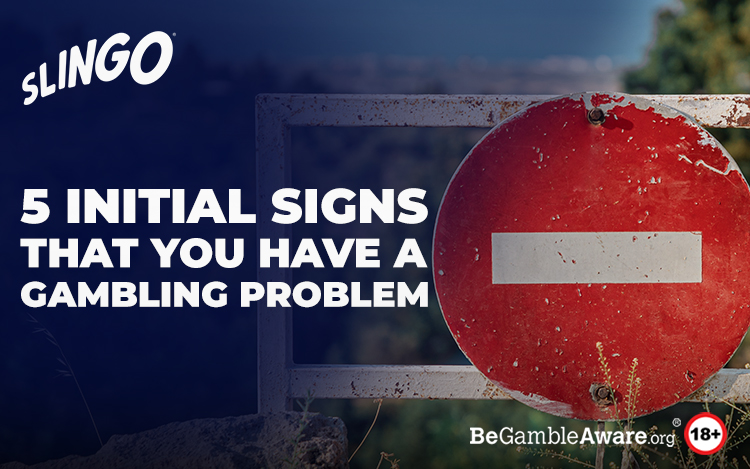Responsible gambling is a vital part of playing casino games online and should underpin every decision you make when playing. Gambling addiction tends to start small, and therefore it is vital to catch it early, which is why we have created this guide to highlight five of the early signs of gambling addiction.
1. Gambling is all you think about
One of the biggest signs that you’re developing a gambling addiction is a preoccupation with gambling. This means that gambling is all you can think about, and is an inherent feature of all kinds of addiction. You can't wait to place your next wager, possibly win, or make up for a previous loss. You can wager on anything, not just cards and dice games, anything that feels like it will scratch that incessant itch. You spend a lot of time thinking about odds and bets, and you're counting down the days until you can turn your next paycheck into a bet. You replay your previous victories and obsess about previous losses. This preoccupation with gambling is a central part of what is known as ‘compulsive gambling’, which is the obsessive need to gamble. Compulsive gambling is an irrepressible need to keep gambling despite the negative consequences.
2. Continuous Gambling No Matter the Consequences
Because gambling is the only thing on your mind, you will neglect other elements of your life, both emotionally and professionally. At the start this may just be minor things such as cancelling plans so you can gamble or doing the bare minimum at work so you can get to gambling, this can get dramatically more severe very quickly. Education and career advancement are not a priority meaning you can quite literally watch life and opportunities pass you by. Rather than spending your money on items that are good or necessary, you gamble away your income and savings. This is one of the most worrying elements of gambling addiction, as you can get into severe debt which can lead to bankruptcy and financial ruin. Relationships can be strained, especially if you lie about your addiction or rely on others to support you. Your deception can cause irreparable damage to your friends and family, leading to divorce, loss of custody, or isolation. If you steal money to fuel your gambling habit, you may face criminal charges.
3. Chasing your losses
Chasing your losses is a trap that new players can fall into and is something that should be stamped out from day one of gambling online to help avoid developing a toxic gambling problem. The majority of gamblers are aware of when to stop. They limit the amount of money that can be bet or the number of bets that can be put in a specific amount of time. Gambling addicts don't know when to say "no," preferring to wager on the next bet in the hopes of compensating for previous losses. They keep chasing these losses, wager after bet, day after day until they lose control. Even if they are winning, they have the want to wager again, possibly for larger sums of money in exchange for a higher excitement and prospective return which all ultimately leads to a loss and the repetition of the cycle.
4. Lying about Gambling
Addiction is still considered a very taboo subject, despite how many of us have experienced it to some degree. Serious addiction can lead to ‘shameful’ habits such as stealing or neglecting commitments which is why most addicts will try to avoid confessing their problem or lie about the severity of the situation they're in. In the early days of gambling problems, you might find you tell little white lies, such as how long you spent gambling, what you were up to on the weekend, and so on, but these lies can quickly escalate. If you have a gambling addiction, you'll probably try to hide your gambling by hiding receipts or bank records. To avoid being questioned or suspected of gambling, people may lie about where they are going. It's critical for the gambler to understand that hiding such things from their loved ones is wrong and that their gambling has an impact not just on their own life, but also on the lives of others around them.
5. Experience Withdrawal Symptoms
Gambling addicts may get restless or agitated when they are not gambling or trying to reduce their betting, just as an alcoholic may have physical and emotional symptoms and adverse effects from not drinking. When a person with a gambling addiction quits gambling, even for 24 hours, emotional withdrawal symptoms might arise.
These signs and symptoms could include:
- irritability
- depression
- anxiety
- restlessness
- sleep deprivation and low appetite
Gamblers who are going through withdrawal believe that they need to gamble in order to feel normal or joyful again. Sometimes the withdrawal symptoms experienced are so strong that addicts will return to gambling simply to be rid of them.
Know When To Stop
The best way to avoid falling into toxic gambling habits is to know when to stop from day one. Cement it in your mind that online gambling is a fun hobby that isn’t meant to be a money-making solution. While there can be moments of excitement there can also be lows, and it’s important to not let your emotions dictate your gameplay. Instead, regularly ask yourself this simple question; ‘Am I having fun?’. If the answer is no, then stop playing. Before playing you should also always set a budget and session time, and stick to these limitations. If you want to know more about responsible gambling practices then read or guide; Responsible Gambling: Know When to Stop.
Gamble Responsibly at Slingo.com
At Slingo.com we always want our players to gamble responsibly, which is why you’ll always find links to responsible gaming guides, support services and more, all available at the bottom of every page on our site. Sign up and play today at Slingo.com, and always gamble responsibly.






